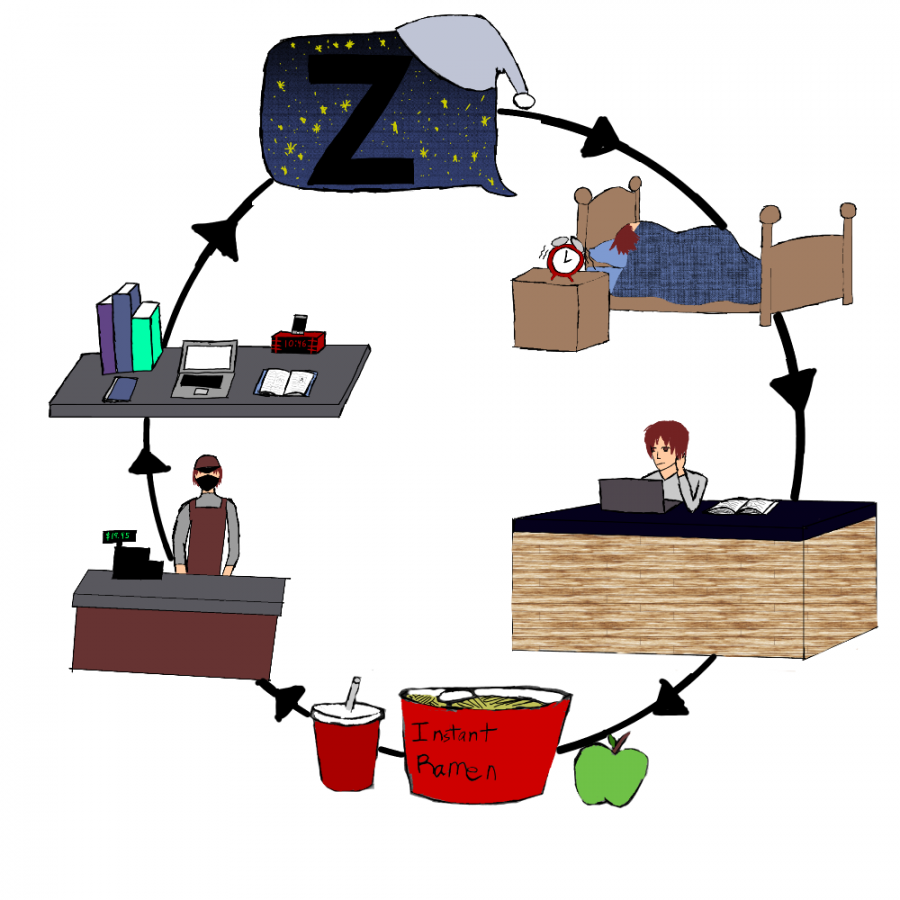Wake up. Do school. Grind out assignment after assignment, go to work, come home and do more homework, and then repeat the cycle the next day. It’s certainly not a secret that life has been monotonous and boring since school went online, but it’s particularly bad for seniors, with the pressure of college admissions, applying for scholarships, and extracurriculars being stacked on top of living through a global health crisis.
Senior Jenna Scott has been living no different from the vast majority of seniors.
“I wake up, roll out of bed, get dressed, and go to class,” Scott said. “I’m in school all day. And then I get ready for work, I leave, I come back at about nine o’clock on weekdays. And then I do homework for a while, and then sleep. So it’s pretty exhausting.”
Scott said her main focus on school was just graduating, as online school has had a large toll on her well-being.
“It’s just the same thing every day,” Scott said. “And as much as I like structure, I don’t like structure that much. I do like to have a little variety in my life and it’s just disheartening to see all the blank screens and stuff.”
Scott is not alone in her troubles. According to senior counselor Jan Rasmussen, there are a greater amount of failing grades this year, although they are being counted as incomplete as opposed to what would normally be considered failing. Rasmussen believes the main reason for these problems is the lack of social interaction.
“It’s hard to grind it out and do the work and not see the benefits of seeing your friend or hanging out,” Rasmussen said, “so I understand that it’s hard.”
Senior English teacher Jordan Ruppert agrees with Rasmussen.
“For so many students, what happens in class is really just extra for all of the rest of the high school experience: sports and debate, dances and assemblies, plays and concerts, lunch with friends, etc,” Ruppert wrote in an email. “Remove all of those positive (and fun) motivating factors and it’s hard to sell an investment in just the academics.”
Rasmussen said the important thing to remember was what students miss out on when they don’t pay attention in class and take things away from them.
“You lose options,” Rasmussen said. “If you don’t do a certain part of your responsibilities, then some of those options disappear.”
However, Rasmussen has a slightly more positive view of the situation than many students have, looking at things from the position of a counselor.
A big part of Rasmussen’s job is calling people that aren’t showing up to class or turning stuff in, an idea a lot of students have found themselves contemplating. Nonetheless, Rasmussen said this year has actually been pretty much on the level of previous years, at least in terms of contacting people.
“For the most part, seniors have been really good about responding,” Rasmussen said. “It may take a little more effort, but for the most part, kids have responded. Now, it’s not always what we want to hear, but they’re not dropping off the face of the earth.”
Rasmussen is also hopeful that the excitement when students return to school will offset the effects the nice weather often has on the attendance rate.
The question then becomes what the best way to keep moving ahead and working is. Scott said the thing that has been most helpful for her was the level of understanding shown towards her by her teachers.
“They are listening to us,” Scott said. “When I tell them ‘Hey, I’m not really feeling well today, can I please have my camera off? I promise I’m still paying attention,’ they fully understand. I’ve had some special circumstances this year, and they’ve been very supportive with everything that’s going on.”
On the other hand, Scott said the least helpful teachers have been the ones that, in her opinion, have done a poor job of acknowledging what people are going through, treating online school like regular in-person school instead of adjusting for the situation.
“It’s just kind of insensitive,” Scott said.
Ruppert wrote that he had been trying things such as awarding points for participation and allowing people to select their partners in breakout rooms during class on Zoom.
“[However,] in the end, there’s no substitute for being in-person,” Ruppert wrote.
Rasmussen said the most important thing someone could do to get through this was to put in the work and do their assignments one at a time.
“One thing at a time, one hour at a time, one day at a time, one week at a time . If you look at everything you have to do in the next four months, that can be overwhelming,” Rasmussen said. “But if you take one day, one hour at a time, and you cross things off, it’s a little more manageable…I think that’s the biggest thing…is persevering,” Rasmussen said. “Everything’s harder. Everything takes longer. But in the end, it’s worth it.”



